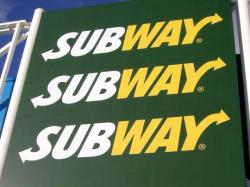Subway Recognizes Vendor Partners For Sustainability Efforts
August 19, 2010 | 3 min to read

MILFORD, Conn., Aug. 18 — The SUBWAY restaurant chain, which has made a commitment to make its restaurants and global operations more environmentally responsible, presented Sustainability Awards to three vendors at its annual convention, recently held in Chicago.
The companies recognized are: Pactiv's PWP Industries of Vernon, California; Matosantos Commercial Corp. of Vega Bajam, Puerto Rico; and Closed Loop Recycling of Smithfield, Australia.
Matosantos, a food distributor, created a state-of-the-art facility that features robust water recovery and treatment programs. In addition, its newest building has a reflective roof design, which reduces temperatures inside by as much as 15-percent.
Closed Loop undertook a recycling initiative in Australia which saw 130,000 tons of materials removed from the waste stream to be later recycled and remanufactured.
"We are committed to creating a sustainable environment in every aspect of our business," said Jan Risi, President of the SUBWAY(r) franchisee-run Independent Purchasing Cooperative (IPC). "But just saying you want to be sustainable won't make it happen. There needs to be a commitment on every level, from our franchisees to our distributors. We are lucky in that we have vendors that share our commitment to make the earth a better place for our children. And Pactiv's PWP Industries, Matosantos and Closed-loop are perfect examples of vendors who share our commitment and want to work with us to reach our shared goals."
Pactiv's PWP Industries created a salad bowl and lid, used by the SUBWAY(r) chain in 23,400 locations around the world, using PETE (polyethylene terephalate – the most recycled of all plastics) made from a minimum of 25 percent post-consumer recycled content, primarily derived from recycled Coca-Cola brand soda and water bottles. In addition, Pactiv's PWP Industries, working together with SUBWAY(r), re-designed the bowls to use less plastic material while still being able to hold the same amount of food. The reduction allows for more efficient bulk packaging – freeing up space during shipping, and ultimately reducing the amount of trucks on the road needed for deliveries.
The salad bowl will:
Reduce the amount of plastic material used annually by 844,933 pounds;
Reduce 25,542 cases of corrugate annually; and
Reduce the carbon footprint by 24 percent or 84.8 kilograms of carbon dioxide equivalent (CO2e) per thousand containers produced.
"At Pactiv's PWP, we are dedicated to making the best packaging on the market with an unequaled commitment to the environment. Receiving the coveted Sustainability Award from Subway is a gratifying achievement and we are honored to be recognized by such a well-respected establishment,"
said Ira Maroofian, President of PWP Industries. "We saw an opportunity at Subway to make an impactful change by using Post-Consumer Recycled PETE. This material is made at our state-of-the-art Recycling Center that opened in 2009 in West Virginia. Coupled with our innovative re-design, we believe we accomplished the positive environmental impact that Subway had in mind. We are fortunate to work with such a forward thinking partner who shares our sustainable vision toward a greener future for our planet."
Pactiv's PWP Industries also constructed a plant closer to the Distribution Center, reducing almost one million transportation miles annually.
"Pactiv's PWP is a wonderful partner; always coming to the table with great ideas," said SUBWAY(r) Marketing Director, Elizabeth Stewart, who oversees the brand's sustainability efforts. "They understand our commitment to sustainability and have taken it to the highest level."
The SUBWAY(r) chain has taken a number of steps to make its restaurants and operations more sustainable, such as:
— Napkins made with 100 percent recycled fiber with up to 49 percent post consumer content,
— Towel and tissue products made with 100 percent recycled material and up to 75 percent post consumer content.
— 78% of paper packaging contains recycled content.
— Plants and distribution centers strategically located to significantly reduce transportation costs, fuel use and carbon emissions.
— Eight certified eco-stores- and more on the way
In 2009 alone, the SUBWAY(r) chain's initiatives accomplished the following :
— Cut carbon omissions by 123,751 metric tons.
— Saved 17.3 million truck miles and 3 million gallons of diesel fuel.
— Preserved 146,880 trees.
Additionally, in 2006, all new and remodeled restaurants were constructed with low flow faucets, saving more than 78 million gallons of water annually. And starting in September 2010, new mops for use in each store will be made from 100 percent recycled material including recycled cotton from socks and t-shirts, recycled soda bottles and recycled plastic bottle caps.
Source: Subway
